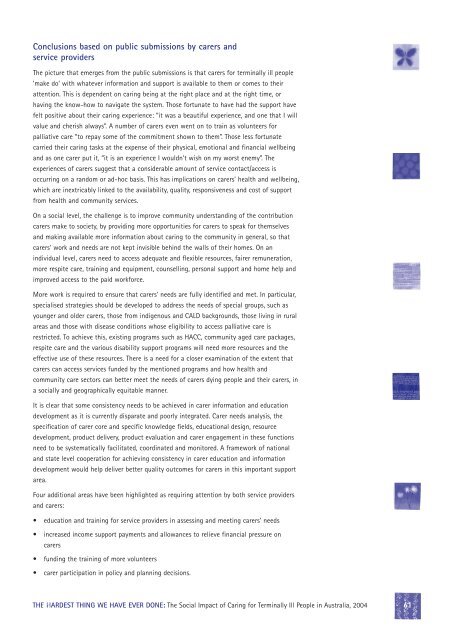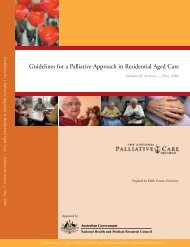The hardest thing we have ever done - Palliative Care Australia
The hardest thing we have ever done - Palliative Care Australia
The hardest thing we have ever done - Palliative Care Australia
Create successful ePaper yourself
Turn your PDF publications into a flip-book with our unique Google optimized e-Paper software.
Conclusions based on public submissions by carers and<br />
service providers<br />
<strong>The</strong> picture that emerges from the public submissions is that carers for terminally ill people<br />
‘make do’ with what<strong>ever</strong> information and support is available to them or comes to their<br />
attention. This is dependent on caring being at the right place and at the right time, or<br />
having the know-how to navigate the system. Those fortunate to <strong>have</strong> had the support <strong>have</strong><br />
felt positive about their caring experience: “it was a beautiful experience, and one that I will<br />
value and cherish always”. A number of carers even <strong>we</strong>nt on to train as volunteers for<br />
palliative care “to repay some of the commitment shown to them”. Those less fortunate<br />
carried their caring tasks at the expense of their physical, emotional and financial <strong>we</strong>llbeing<br />
and as one carer put it, “it is an experience I wouldn’t wish on my worst enemy”. <strong>The</strong><br />
experiences of carers suggest that a considerable amount of service contact/access is<br />
occurring on a random or ad-hoc basis. This has implications on carers’ health and <strong>we</strong>llbeing,<br />
which are inextricably linked to the availability, quality, responsiveness and cost of support<br />
from health and community services.<br />
On a social level, the challenge is to improve community understanding of the contribution<br />
carers make to society, by providing more opportunities for carers to speak for themselves<br />
and making available more information about caring to the community in general, so that<br />
carers’ work and needs are not kept invisible behind the walls of their homes. On an<br />
individual level, carers need to access adequate and flexible resources, fairer remuneration,<br />
more respite care, training and equipment, counselling, personal support and home help and<br />
improved access to the paid workforce.<br />
More work is required to ensure that carers’ needs are fully identified and met. In particular,<br />
specialised strategies should be developed to address the needs of special groups, such as<br />
younger and older carers, those from indigenous and CALD backgrounds, those living in rural<br />
areas and those with disease conditions whose eligibility to access palliative care is<br />
restricted. To achieve this, existing programs such as HACC, community aged care packages,<br />
respite care and the various disability support programs will need more resources and the<br />
effective use of these resources. <strong>The</strong>re is a need for a closer examination of the extent that<br />
carers can access services funded by the mentioned programs and how health and<br />
community care sectors can better meet the needs of carers dying people and their carers, in<br />
a socially and geographically equitable manner.<br />
It is clear that some consistency needs to be achieved in carer information and education<br />
development as it is currently disparate and poorly integrated. <strong>Care</strong>r needs analysis, the<br />
specification of carer core and specific knowledge fields, educational design, resource<br />
development, product delivery, product evaluation and carer engagement in these functions<br />
need to be systematically facilitated, coordinated and monitored. A framework of national<br />
and state level cooperation for achieving consistency in carer education and information<br />
development would help deliver better quality outcomes for carers in this important support<br />
area.<br />
Four additional areas <strong>have</strong> been highlighted as requiring attention by both service providers<br />
and carers:<br />
• education and training for service providers in assessing and meeting carers’ needs<br />
• increased income support payments and allowances to relieve financial pressure on<br />
carers<br />
• funding the training of more volunteers<br />
• carer participation in policy and planning decisions.<br />
THE HARDEST THING WE HAVE EVER DONE: <strong>The</strong> Social Impact of Caring for Terminally Ill People in <strong>Australia</strong>, 2004<br />
61<br />
61
















